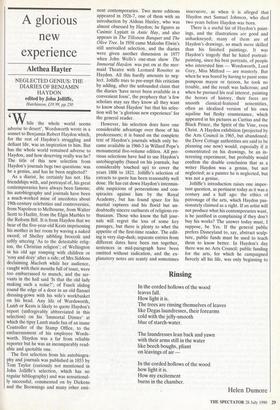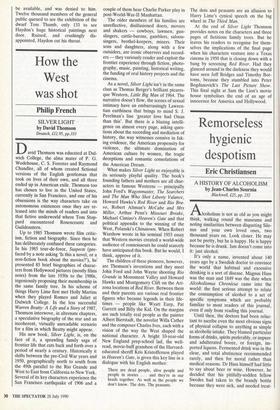A glorious new experience
Alethea Hayter
NEGLECTED GENIUS: THE DIARIES OF BENJAMIN HAYDON edited by John JolWe, Hutchinson, £19.99, pp.250 While the whole world seems adverse to desert', Wordsworth wrote in a sonnet to Benjamin Robert Haydon which, for the rest of Haydon's struggling and defiant life, was an inspiration to him. But has the whole world remained adverse to Haydon, and how deserving really was he? The title of this new selection from Haydon's journals begs two questions: was he a genius, and has he been neglected?
As a diarist, he certainly has not. His friendships with, and portrayal of, his great contemporaries have always been famous; his autobiography and journals have been a much-worked mine of anecdotes about 19th-century celebrities and controversies, from Napoleon to Melbourne, from Walter Scott to Hazlitt, from the Elgin Marbles to the Reform Bill. It is from Haydon that we hear of the five-year-old Keats imprisoning his mother in her room by waving a naked sword; of Shelley nibbling broccoli and softly uttering `As to the detestable relig ion, the Christian religion'; of Wellington in his old age romping with children or `rosy and dozy' after a ride; of Mrs Siddons declaiming Macbeth while her audience, caught with their mouths full of toast, were too embarrassed to munch, and the ser- vants in the hall said 'Is that the old lady making such a noise?'; of Fuseli sliding round the edge of a door in an old flannel dressing-gown with his wife's workbasket on his head. Any life of Wordsworth, Lamb or Keats is likely to quote Haydon's report (unforgivably abbreviated in this selection) on his 'Immortal Dinner' at which the tipsy Lamb made fun of an inane Controller of the Stamp Office, to the embarrassment of his employee Words- worth. Haydon was a far from reliable reporter but he was an incomparably read- able and quotable one.
The first selection from his autobiogra- phy and journals was published in 1853 by Tom Taylor (curiously not mentioned in John Jolliffe's selection, which has no regular bibliography) and was sensational- ly successful, commented on by Dickens and the Brownings and many other emi-
nent contemporaries. Two more editions appeared in 1926-7, one of them with an introduction by Aldous Huxley, who was almost obsessed by Haydon; he figures as Casimir Lypiatt in Antic Hay, and also appears in The Tillotson Banquet and The Olive Tree. In 1958 came Malcolm Elwin's still unrivalled selection, and the diaries were given another dimension in 1977 when John Wells's one-man show The Immortal Haydon was put on at the mer- maid Theatre with Leonard Rossiter as Haydon. All this hardly amounts to neg- lect. Jolliffe tries to pre-empt this criticism by adding, after the unfounded claim that the diaries 'have never been available in a convenient form', the prophecy that 'a few scholars may say they know all they want to know about Haydon' but that his selec- tion will be 'a glorious new experience' for the general reader.
However, his selection does have one considerable advantage over those of his predecessors; it is based on the complete text of Haydon's journals which only be- came available in 1960-3 in Willard Pope's monumental five-volume edition. All pre- vious selections have had to use Haydon's autobiography (based on his journals, but considerably touched up) to cover the years 1808 to 1821. Jolliffe's selection of extracts to quote has been reasonably well done. He has cut down Haydon's intermin- able suspicions of persecutions and con- spiracies against him by the Royal Academy, but has found space for his marital raptures and his florid but un- doubtedly sincere outbursts of religious en- thusiasm. Those who know the full jour- nals will regret the loss of some key passages, but there is plenty to whet the appetite of the first-time reader. The edit- ing is very slap-dash; separate entries from different dates have been run together, sentences in mid-paragraph have been omitted without indication, and the ex- planatory notes are scanty and sometimes inaccurate, as when it is alleged that Haydon met Samuel Johnson, who died two years before Haydon was born.
There is a useful list of Haydon's paint- ings, and the illustrations are good and unhackneyed; many of them are of Haydon's drawings, so much more skilled than his finished paintings. It was Haydon's tragedy that he hated portrait- painting, since his best portraits, of people who interested him — Wordsworth, Lord Grey, Miss Mitford — are masterly. But when he was bored by having to paint some pompous mayor or tycoon, he took no trouble, and the result was ludicrous; and when he pursued his real interest, painting the heroes of history, their faces are smooth classical-featured nonentities, often an idealised version of his own aquiline but fleshy countenance, which appeared in his pictures as Curtius and the Black Prince, the Spirit of the Vine, even Christ. A Haydon exhibition (projected by the Arts Council in 1965, but abandoned; the Dove Cottage authorities are said to be planning one now) would, especially if it concentrated on his drawings, be an in- teresting experiment, but probably would confirm the double conclusion that as a writer Haydon was a genius, but not neglected; as a painter he is neglected, but was not a genius.
Jolliffe's introduction raises one impor- tant question, as pertinent today as it was a century and a half ago: the ethics of patronage of the arts, which Haydon pas- sionately claimed as a right. If an artist will not produce what his contemporaries want, is he justified in complaining if they don't buy his works? The answer today must, I suppose, be Yes. If the general public prefers Disneyland to, say, abstract sculp- ture, public funds must be used to teach them to know better. In Haydon's day there was no Arts Council; public funding for the arts, for which he campaigned fiercely all his life, was only beginning to be available, and was denied to him. Twelve thousand members of the general public queued to see the exhibition of the dwarf Tom Thumb, only 133 to see Haydon's huge historical paintings next door. Ruined, and crushingly dis- appointed, Haydon cut his throat.



















































 Previous page
Previous page